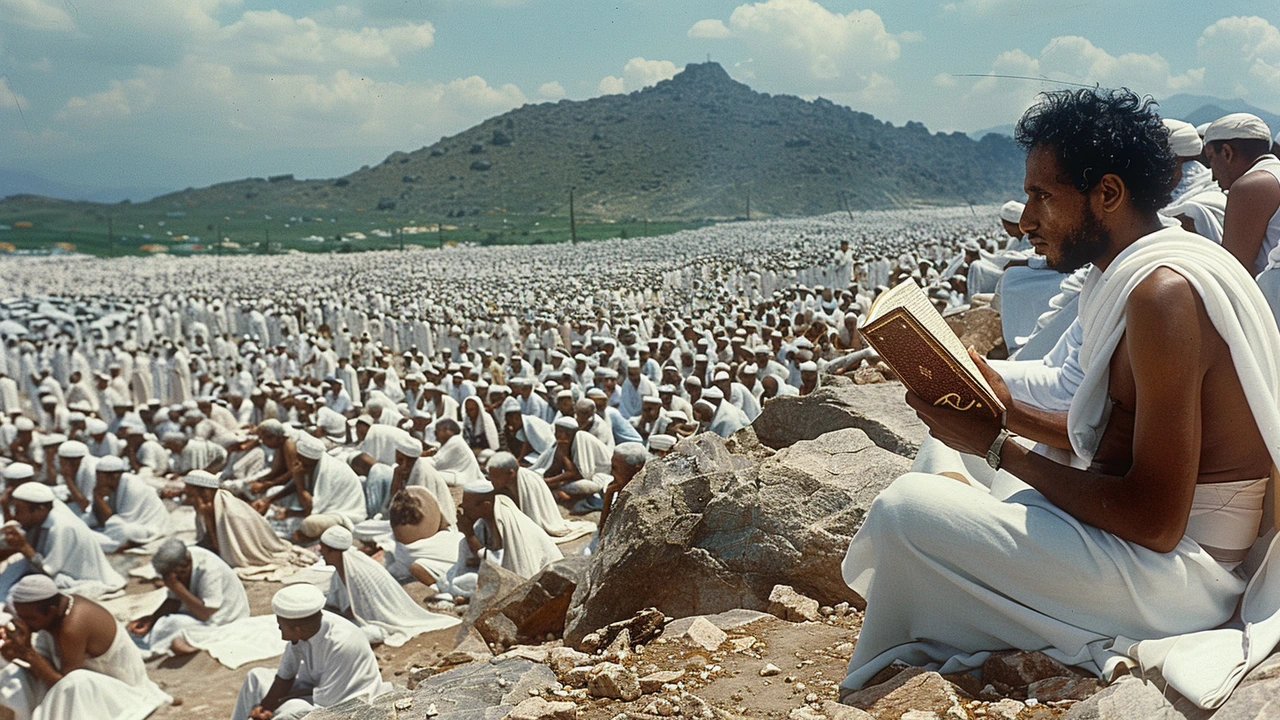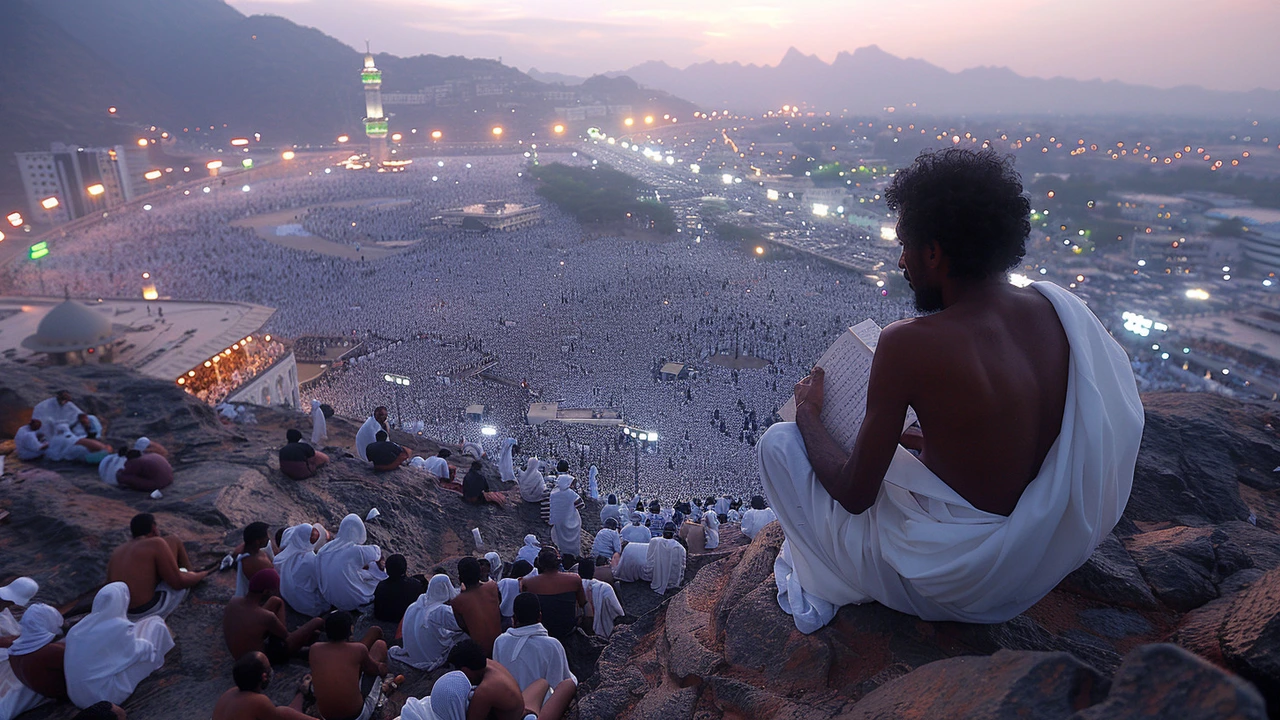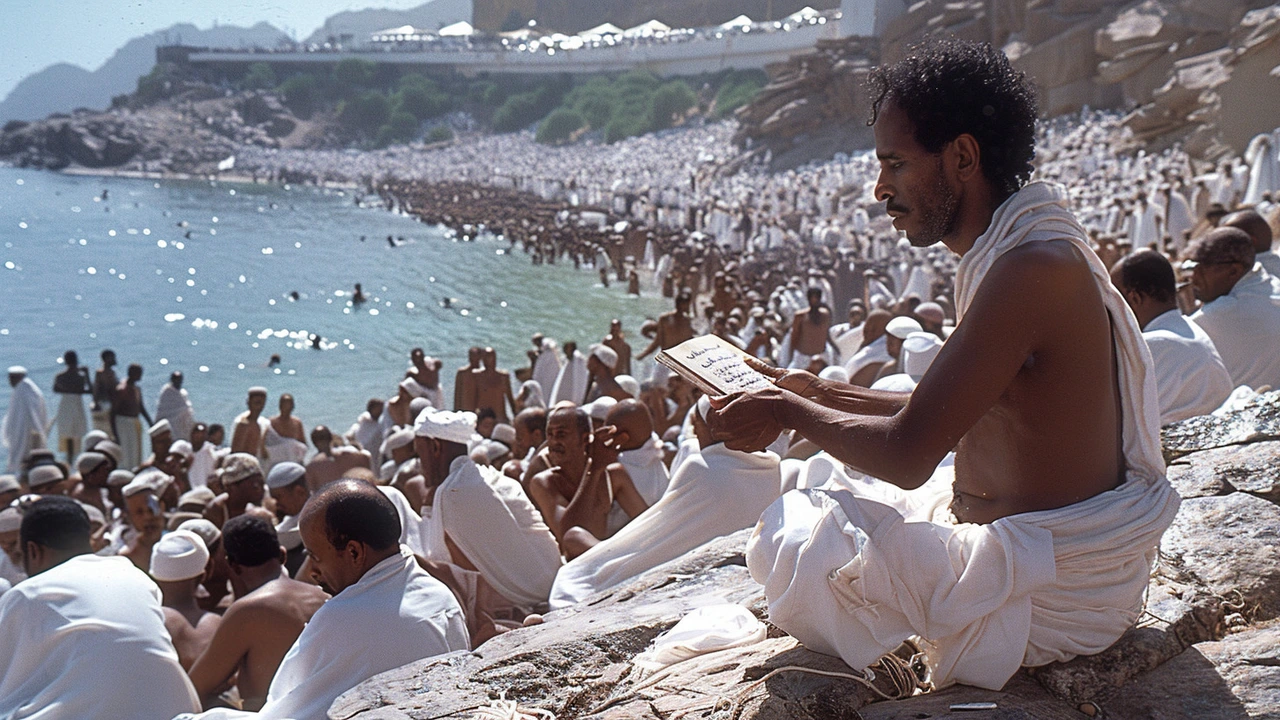 Jun, 15 2024
Jun, 15 2024
The Spiritual Significance of Arafah and Arafat in Hajj 2024
The Hajj pilgrimage, one of the five pillars of Islam, is a sacred journey that millions of Muslims undertake to fulfill their religious duty. Central to this pilgrimage are the Day of Arafah and the Plains of Arafat, each holding deep spiritual connotations and traditions. The Day of Arafah, observed on June 15, 2024, in Saudi Arabia, UAE, Gulf countries, USA, UK, and on June 16, 2024, in India, Pakistan, Bangladesh, and other South Asian countries, stands as one of the pinnacle moments in the Islamic calendar.
The Day of Arafah: A Day Of Mercy, Forgiveness, and Blessings
The Day of Arafah is regarded by Muslims worldwide as a day of unparalleled devoutness and seeking forgiveness. Muslims believe that fasting on this day atones for the sins of the past and the coming year, a belief rooted in the teachings of Prophet Muhammad (PBUH). This day is not only about refraining from eating and drinking but also an intensive period of prayer, reflection, and seeking Allah’s grace and mercy.
During Hajj, the Day of Arafah is the culmination of the pilgrimage, a day when pilgrims gather in earnest on the vast Plains of Arafat. It is mentioned in Islamic texts that the reward for striving during Arafah is immense and that Allah's mercy is abundant. For pilgrims standing in Arafat, it is a journey towards spiritual purification. For those unable to join the pilgrimage, fasting on this sacred day is highly meritorious, providing an opportunity to cleanse and renew their faith.
Gathering at the Plains of Arafat
The Plains of Arafat, about 20 kilometers southeast of Mecca, is where millions of pilgrims convene for prayer, supplication, and deep reflection. This vast expanse becomes a transformative landscape where Muslims from diverse backgrounds and ethnicities come together in unity and devotion.
At the heart of Arafat lies the symbolic Mount of Mercy or Jabal al-Rahmah. Historically, it is here that Prophet Muhammad (PBUH) delivered his Farewell Sermon during his last pilgrimage. The Farewell Sermon is pivotal as it encapsulated critical tenets of Islamic faith, social justice, and guidance for living a righteous life. The atmosphere at Arafat is filled with introspection and spiritual vibrancy, making it a cornerstone of the Hajj pilgrimage.
Mount of Mercy: A Symbol of Unity and Equality
Among the many acts performed on the Plains of Arafat, standing on Mount of Mercy is especially significant. This act of standing, or Wuquf, symbolizes the unity and equality of all believers before God. The white garments or Ihram worn by pilgrims further accentuate this sense of unity, erasing societal distinctions of wealth, status, or nationality, fostering a sense of humility and equality.
As the sermon of the Prophet emphasized, acts of kindness, the importance of righteous conduct, and the principles of justice and equality continue to resonate among pilgrims. The physical act of standing is complemented by a spiritual stand, a pledge to uphold the values and ethics taught by Islam.
After Arafat: The Journey Continues
Upon completing their time in Arafat, the pilgrims move to Muzdalifah, carrying with them the profound sense of spirituality and forgiveness towards the next rites of Hajj. At Muzdalifah, they gather pebbles in a serene environment and prepare for the symbolic stoning of the devil in Mina, which represents the rejection of evil and sin.
The sequence of Hajj rites, including the stoning ritual, the sacrifice, and other acts of worship and reflection, form a cohesive journey that embodies the principles of faith, repentance, and rejuvenation. It is a pathway towards spiritual renewal and a deeper connection with Allah.

Arafat's Significance Beyond Hajj
The importance of Arafat extends beyond the pilgrimage season. Throughout the year, the Plains of Arafat draw visitors who seek to connect with the historical and spiritual essence of the site. The memories of the pilgrimage, the Farewell Sermon, and the acts of worship performed here find a lasting place in the hearts of Muslims.
This site turns into a beacon of faith, reflecting the journey of Prophet Muhammad and the legacy he left for his followers. The transformative nature of Hajj is not just a physical journey but a profound, ongoing spiritual voyage that impacts the lives of believers across the globe.
The Transformative Nature of Hajj
Hajj is more than just a pilgrimage; it is a profound spiritual experience that offers Muslims the chance for purification and redemption. The unity exhibited during Hajj, from Arafat to the rites in Mina, mirrors the universal principles of humanity, compassion, and unwavering faith.
For many, Hajj becomes a turning point, a time when they can reflect deeply on their lives, seek forgiveness for past misdemeanors, and promise to live in adherence to Islamic values moving forward. It is a transformative period that brings about significant personal growth and spiritual depth.

Conclusion
The Day of Arafah and the Plains of Arafat hold an exceptional place in the hearts of Muslims around the world. As the focal points of the Hajj pilgrimage, they are imbued with immense religious, historical, and spiritual significance. Whether participating in the pilgrimage or fasting and praying from afar, Muslims find in these practices a profound connection to their faith and community. The virtues of mercy, forgiveness, and unity that Arafah and Arafat exemplify remain essential elements of the Islamic faith, resonating with believers and inspiring devotion worldwide.

Christopher Boles
June 15, 2024 AT 19:32The spirit of Arafah really shows how unity can bring peace. Millions gather, yet each feels a personal connection to the divine. It’s a reminder that we can all stand together, regardless of background. The simple act of standing on the plains turns into a powerful expression of humility. When people fast and pray, they experience a deep inner calm.
Crystal Novotny
June 17, 2024 AT 13:12One could argue that the emphasis on forgiveness is a social construct designed to control masses.
Reagan Traphagen
June 19, 2024 AT 06:52They want you to think the Day of Arafah is just about spirituality, but it’s actually a massive geopolitical tool. The gatherings are monitored, the narratives are curated, and anyone who dares to question the symbolism gets silenced. It’s not a coincidence that the same dates line up with power shifts in the region. Stay aware.
mark sweeney
June 21, 2024 AT 00:32yeah i think the whole "spiritual" vibe is just a cover for bigger agendas. the billions of pilgrims cant even see the real story behind the rituals lol.
randy mcgrath
June 22, 2024 AT 18:12Standing on the mount really hits home for many.
Frankie Mobley
June 24, 2024 AT 11:52The cultural significance of Arafah goes beyond the rites themselves. It brings people from every corner of the globe together, sharing food, stories, and prayers. Simple acts like gathering at the plains foster a sense of global community that is rare in today’s world.
ashli john
June 26, 2024 AT 05:32That sense of community is exactly what we need more of especially when we feel isolated its great to see people connecting over shared values
Kim Chase
June 27, 2024 AT 23:12I think the Arafah rite is a beautful example of humanity coming together in reverence.
David Werner
June 29, 2024 AT 16:52But don't forget the hidden surveillance grids that monitor every step of the crowd. The sheer scale makes it a perfect arena for data collection, and the world is watching. It's dramatic how spiritual devotion can double as a data harvest.
Paul KEIL
July 1, 2024 AT 10:32From a sociological perspective, the ritualistic homogenization during Arafah exemplifies functionalist integration, thereby reinforcing collective conscience.
Horace Wormely
July 3, 2024 AT 04:12While your phrasing is sophisticated, note that “homogenization” should be followed by a comma when linking clauses.
christine mae cotejo
July 4, 2024 AT 21:52When I think about the Day of Arafah, a cascade of images floods my mind – a sea of white garments stretching to the horizon, the endless echo of prayers rising like incense, the shared heartbeat of millions synchronized in devotion. The very act of standing on the Mount of Mercy feels like a tangible bridge between humanity and the divine, a place where every individual, regardless of rank or wealth, becomes equal under the gaze of the Almighty. In my own journey, I have witnessed strangers offering whispered words of encouragement, a subtle nod, a gentle touch on the shoulder that says, “You are not alone.” This collective empathy transforms a simple ritual into a profound experience of universal brotherhood. The fasting observed by those unable to travel further expands the spiritual canvas, allowing hearts across continents to align with the pilgrims, creating a worldwide tapestry of intercession and hope. It is fascinating how the very notion of forgiveness, articulated by scholars over centuries, takes on a living, breathing form on that sacred plain. The Farewell Sermon, echoed through centuries, still resonates as a reminder of justice, compassion, and the social responsibilities we bear. As the sun sets, the shadows of the countless pilgrims merge, symbolizing the dissolution of ego and the rebirth of humility. Even after leaving Arafat, the journey continues in Muzdalifah, where the gentle gathering of pebbles under the night sky reminds us of the fragile nature of our aspirations. Each stone becomes a promise, a silent vow to reject the whispers of the devil that linger within. Throughout the year, the plains beckon the faithful to revisit that powerful experience, ensuring that the spiritual imprint never fades. In my reflections, I recognize that the transformation is not merely a momentary ascent but a lifelong pilgrimage of the soul. The virtues of mercy, forgiveness, and unity that Arafah embodies continue to guide my actions, urging me to extend compassion in everyday encounters. Ultimately, the Day of Arafah stands as a testament to humanity’s capacity for collective reverence, a beacon that illuminates the path toward inner purification and global harmony.
Douglas Gnesda
July 6, 2024 AT 15:32From a linguistic standpoint, the terminology used during the rites showcases a rich interplay of classical Arabic lexicon and contemporary vernacular, which underscores the dynamic evolution of religious discourse.
Abhijit Pimpale
July 8, 2024 AT 09:12The Day of Arafah aligns with the lunar calendar, which is why dates shift yearly.
Eric DE FONDAUMIERE
July 10, 2024 AT 02:52Nice point.
Pauline Herrin
July 11, 2024 AT 20:32While the description is thorough, it omits the critical analysis of how modern infrastructure influences the pilgrim experience.
pradeep kumar
July 13, 2024 AT 14:12Honestly the whole narrative feels overrated when you consider the hidden politics behind the scenes.
love monster
July 15, 2024 AT 07:52It’s uplifting to see how people support each other during such intense moments; the compassion truly shines.
Christian Barthelt
July 17, 2024 AT 01:32While many celebrate the unity, it’s worth noting that the logistical coordination is a massive bureaucratic endeavor that often goes unexamined.
Ify Okocha
July 18, 2024 AT 19:12The narrative ignores the systematic manipulation of information, making the whole thing a staged spectacle for global consumption.